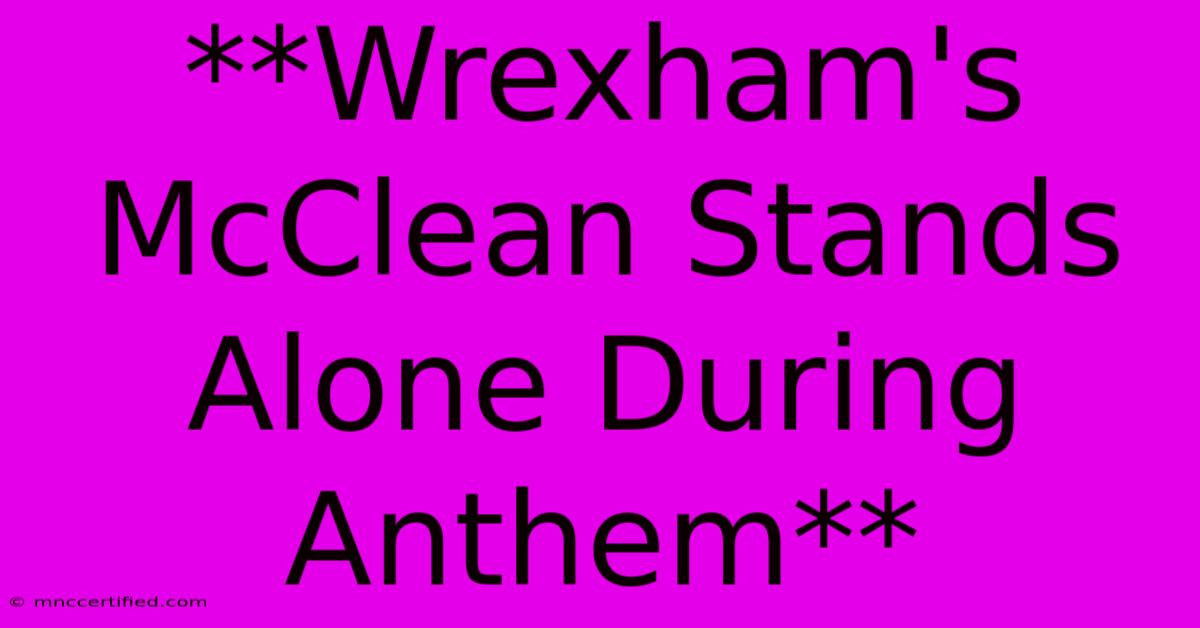**Wrexham's McClean Stands Alone During Anthem**

Table of Contents
Wrexham's McClean Stands Alone During Anthem: A Look at the Controversy
The recent incident involving Wrexham AFC midfielder Paul McClean refusing to sing the English national anthem has ignited a heated debate within the footballing world. While some view his actions as a form of protest, others see it as a sign of disrespect towards the club and its supporters.
This article will delve deeper into the controversy surrounding McClean's actions, exploring the potential reasons behind his decision and examining the diverse reactions it has garnered.
The Background: McClean's Past and the Irish Tricolour
McClean's history with the English national anthem is well documented. The Irish international, who hails from Derry, Northern Ireland, has been known to stand with his arms crossed or turn his back during the singing of "God Save the King" throughout his career. This stems from his Irish republican background and his personal opposition to the anthem's association with British rule in Northern Ireland.
His stance has often been interpreted as a symbol of his Irish identity and his solidarity with those who identify with the Irish Republican Army (IRA).
Wrexham's Response and the Public's Reactions
Wrexham AFC, the club McClean plays for, has remained relatively silent on the issue, stating that they respect their players' individual choices. However, the incident has sparked a storm of reactions from fans, media, and even politicians.
Some supporters have voiced their disapproval, criticizing McClean for disrespecting the club and its fans. Others have defended his right to personal expression and praised his unwavering commitment to his beliefs.
The situation has also been commented upon by political figures, with some criticizing McClean's actions while others have defended his right to protest.
Understanding McClean's Perspective
It is crucial to understand that McClean's decision is deeply rooted in his personal beliefs and experiences. His background in Derry, a city steeped in Irish republican history and plagued by conflict for decades, likely influences his perspective on the English national anthem.
His refusal to sing can be interpreted as a form of protest against a symbol that he sees as representing British rule and its legacy in Ireland.
The Importance of Dialogue and Respect
While McClean's actions have sparked controversy, they also offer a valuable opportunity for discussion and reflection. It is crucial to approach this issue with sensitivity and respect for all perspectives, recognizing the complex history and emotions surrounding the Irish question.
The incident highlights the need for open dialogue and understanding, promoting a culture of acceptance and tolerance within the football community.
Ultimately, it is essential to acknowledge that individuals have the right to express their beliefs and opinions, even when those beliefs may differ from the majority. While McClean's decision may be controversial, it is important to engage in respectful dialogue and strive for a more inclusive and understanding society.

Thank you for visiting our website wich cover about **Wrexham's McClean Stands Alone During Anthem**. We hope the information provided has been useful to you. Feel free to contact us if you have any questions or need further assistance. See you next time and dont miss to bookmark.
Featured Posts
-
Association Of Life Insurance Counsel
Nov 10, 2024
-
Gauff Takes Wta Finals 4 8 Million Prize Money Record
Nov 10, 2024
-
Brighthouse Life Insurance Va Marquis
Nov 10, 2024
-
Tom Jones Addresses Uptight Incident With Apology
Nov 10, 2024
-
Insurance Sales Agent Resume Examples
Nov 10, 2024